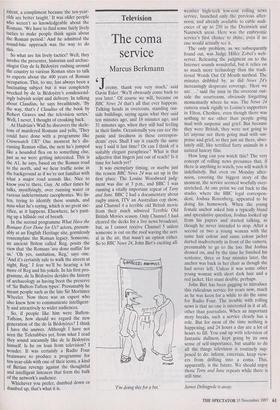Television
The coma service
Marcus Berkmann
Jeremy, thank you very much,' said Gavin Esler. 'We'll obviously come back to you later.' Of course we will, because on BBC News 24 that's all that ever happens. Talking heads in overcoats, standing out- side buildings, saying again what they said ten minutes ago, and 18 minutes ago, and 31 minutes ago, when they still had feeling in their limbs. Occasionally you can see the panic and tiredness in these correspon- dents' eyes. Shall I say it exactly the same way I said it last time? Or can I think of a suitably elegant paraphrase? What is that adjective that lingers just out of reach? Is it time for lunch yet?
It was exemplary timing, or maybe just the reason BBC News 24 was set up in the first place. The Louise Woodward judg- ment was due at 3 p.m., and BBC 1 was running a vitally important repeat of Terry and June. BBC 2 had a documentary about rugby union, ITV an Australian cop show, and Channel 4 a terrible old British movie from their much admired Terrible Old British Movies season. Only Channel 5 had cleared the decks for a live news broadcast, but, as I cannot receive Channel 5 unless someone is out on the roof waving the aeri- al in the air, that wasn't an option either. So to BBC News 24, John Birt's exciting all- I'm doing this for a bet.' weather high-tech low-cost rolling news service, launched only the previous after- noon, and already available to cable audi- ences of up to 250 in the Droitwich and Nantwich areas. Here was the embryonic service's first chance to shine, even if no one would actually see it.
The only problem, as we subsequently found out, was Judge Hiller Zobel's web- server. Releasing the judgment on to the Internet sounds wonderful, but it relies on so much more technology than the tradi- tional Words Out Of Mouth method. The minutes dribbled by, as did News 24's increasingly desperate coverage. 'Here we are ...' said the man in the overcoat out- side the courtroom, obviously forgetting momentarily where he was. The News 24 camera stuck rigidly to Louise's supporters in Elton, Cheshire, even though there was nothing to see other than people going mad with suspense and grief. But because they were British, they were not going to let anyone see them going mad with sus- pense and grief, so they just sat there, abso- lutely still, like terrified furry animals in a natural history film.
How long can you watch this? The very concept of rolling news presumes that, if there is anything to watch, you will watch it indefinitely. But even on Monday after- noon, covering the biggest story of the moment, the service seemed woefully over- stretched. At one point we cut back to the studio, where the BBC legal correspon- dent, Joshua Rozenberg, appeared to be doing his homework. When the young female anchor asked him a typically bland and speculative question, Joshua looked up from his papers and started talking, as though he never intended to stop. After a second or two a young woman with the same hair colour and same colour jacket darted inadvertently in front of the camera, presumably to go to the loo. But Joshua droned on, and by the time he finished his sentence, three or four minutes later, the anchor was back in her chair as though she had never left. Unless it was some other young woman with short dark hair and a red jacket. Her stunt double, perhaps.
John Birt has been gagging to introduce this ridiculous service for years now, much as he was keen for a while to do the same for Radio Four. The trouble with rolling news is that no one is interested in it at all, other than journalists. When an important story breaks, such a service clearly has a role. But for most of the time nothing is happening, and 24 hours a day are a lot of hours to fill. You end up with television of fantastic dullness, kept going by its own sense of self-importance, but unable to do all the things television is routinely sup- posed to do: inform, entertain, keep view- ers from drifting into a coma. This, apparently, is the future. We should enjoy those Teny and June repeats while there is still time.










































































 Previous page
Previous page